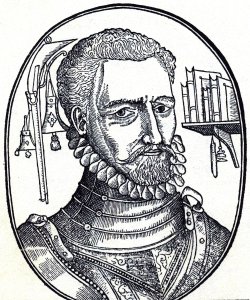Introduction

Born: Circa 1525, Westmorland, England.
Died: October 7, 1577, Walcot Hall, Barnack, Cambridgeshire, England.
Buried: In the Whetstone family vault at St. John the Baptist Church, Barnack, Cambridgeshire.


Born: Circa 1525, Westmorland, England.
Died: October 7, 1577, Walcot Hall, Barnack, Cambridgeshire, England.
Buried: In the Whetstone family vault at St. John the Baptist Church, Barnack, Cambridgeshire.

George was the first son of Sir John Gascoigne of Cardington, Bedfordshire.
He seems to have spent a part of his early life in Westmorland. Educated at Trinity College, Cambridge, he entered the Middle Temple as a law student before 1548.
However, he neglected his studies and led a life of reckless extravagance and dissipation, for which his father disinherited him. In 1555, he moved to Gray’s Inn, but seems to have left it also.
In 1557–58, he represented Bedford in Parliament. In 1565, he returned to Gray’s Inn, and the following year, two plays by him were presented there (The Supposes, adapted from the Italian of Ariosto, and Jocasta, adapted from the Phoenissae of Euripides).
In 1572, he was again made a Member of Parliament for the borough of Midhurst, but objections having been made to his character, he seems not to have taken his seat.
Not long after, he entered the service of William of Orange, who commissioned him a captain. During that service, he was taken prisoner by the Spanish and returned to England.
During his absence, his first book, A Hundredth Sundrie Floures Bound Up in One Small Poesie, which he had left in the hands of a friend, was printed without his permission. After his return from the Netherlands, he published in 1575 a corrected and enlarged edition.
Thereafter he seems to have led a literary life, and was said to have been in some way attached to the court.
On the occasion of Queen Elizabeth’s visit to Kenilworth in the summer of 1575, Gascoigne was commissioned by Leicester to devise the masques, and performed for the Queen’s entertainment.
If you know Gascoigne’s date or place of birth,